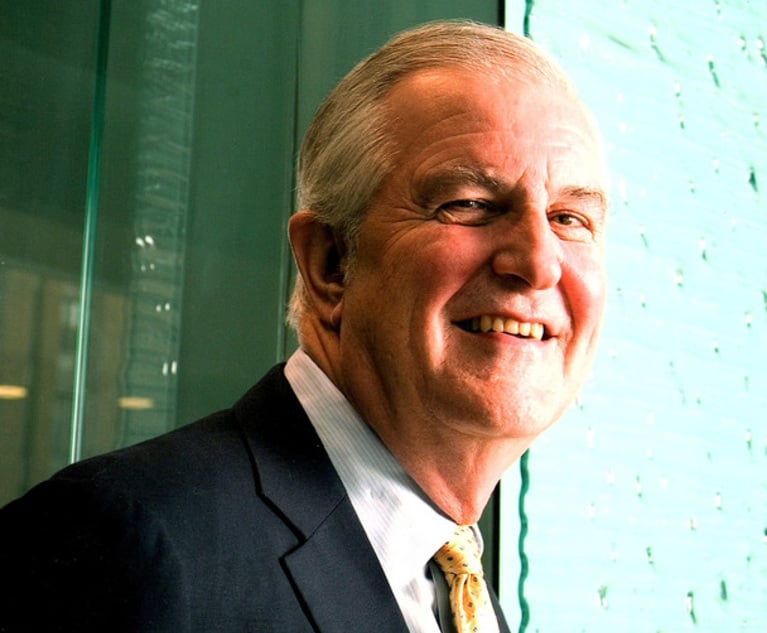 Microsoft's Redmond, Washington, headquarters. Courtesy photo
Microsoft's Redmond, Washington, headquarters. Courtesy photoMicrosoft Names Winning Firms in Legal Innovation Challenge
Pitches by K&L Gates and a combo team of Perkins Coie, Greenberg Traurig and Davis Wright Tremaine exemplify the broadening services and skill sets clients expect from their outside providers.
June 26, 2020 at 02:09 PM
6 minute read
The original version of this story was published on The American Lawyer
Microsoft's legal department has awarded two teams of law firms a slot in its innovation accelerator after a monthslong competition among outside providers that was geared toward investing in technology and solving the tech giant's business challenges.
For three years, Microsoft's legal department, led by the corporate, legal and external affairs team, and now the newly formed Modern Legal Team, have challenged several of its outside providers to think differently about the provision of legal services, efficiency, technology, and just generally work to help Microsoft do more with less. This year, the focus was on digital transformation and the use of technology, and 13 firms (nine teams) competed for a chance for their idea to move into the accelerator program through which Microsoft would help bring the concept to fruition.
Microsoft's picks for the winning projects, along with the entire Legal Business Design Challenge, crystallize the ways in which clients are looking for outside providers to marshal varied skill sets, use technology, collaborate with other providers and do more than just pure legal work.
As Rebecca Benavides, director of legal business for CELA, said before announcing the winners June 17, Microsoft is now doing mission critical work in light of COVID-19, plus the run of business work. So it's more important than ever for the legal department and its outside providers to be investing in and using technology in an effort to operate more efficiently.
Benavides also said Microsoft wants firms to steer those initiatives. "Sometimes we don't know what we want," she said, but law firms can leverage their experience across clients to provide the solution Microsoft couldn't envision. The use of tech is also increasingly factored into Microsoft's RFPs.
"These client-facing solutions/pitches have an added benefit of making the teams doing the work more effective, more efficient and more productive in the delivery of legal services," Benavides added Friday via email. "As we all continue to work from home with our professional and personal lives blending together and competing for our attention, the ability to prioritize efforts, automate workflows and make room for more strategic efforts will be critical."
 The providers competing this year were Arent Fox; Covington & Burling; Fish & Richardson; Integreon; K&L Gates; Merchant & Gould; Orrick, Herrington & Sutcliffe; Sidley Austin; and a combo team of unlikely allies, Davis Wright Tremaine, Greenberg Traurig and Perkins Coie. They were all initially set to pitch their ideas at Microsoft's Redmond, Washington, headquarters in early March, but the event was canceled at the last minute due to the coronavirus outbreak in the area.
The providers competing this year were Arent Fox; Covington & Burling; Fish & Richardson; Integreon; K&L Gates; Merchant & Gould; Orrick, Herrington & Sutcliffe; Sidley Austin; and a combo team of unlikely allies, Davis Wright Tremaine, Greenberg Traurig and Perkins Coie. They were all initially set to pitch their ideas at Microsoft's Redmond, Washington, headquarters in early March, but the event was canceled at the last minute due to the coronavirus outbreak in the area.
In the months that followed, the teams recalibrated and pitched their solutions remotely. On June 17, Microsoft, along with consultants at Bold Duck Studio, announced the winning teams in a two-hour virtual version of the forum.
The winners were: the trio of Greenberg Traurig, Perkins Coie and Davis Wright Tremaine, and the pitch by K&L Gates. Both teams focused on streamlining Microsoft's sales and contracts processes, albeit in very different arenas.
Annette Becker, K&L Gates' relationship partner to Microsoft, has worked with the company for 19 years and was able to quickly see some stumbling blocks in the way of achieving Microsoft's stated goal of becoming carbon negative by 2030.
Becker and a group of other K&L Gates lawyers teamed up with Melissa Speidel, director of K&L Gates' business transformation office, and her team to solve a contractual pain point—the time it took to close renewable purchase agreements. Under the current time-to-close, Microsoft would not meet its 2030 deadline. The artificial intelligence tool K&L Gates' team of lawyers and business professionals will work on during the accelerator program will better harness information on who needs to be involved in contract execution, as well as better organize historical data that can follow contract life cycles even if the people involved in their execution have left the company.
Benavides described K&L Gates' submission among those aimed at "working smarter," and understanding that the scarcest resource a company has is human attention.
The second winning team of Perkins Coie, Greenberg Traurig and Davis Wright Tremaine was described as checking all the boxes. It demonstrated collaboration among providers, the heavy reliance on business professionals and a solution that solved a significant business problem.
The three firms started working together at Microsoft's urging about a year ago when Judy Jennison, the client lead for Microsoft from Perkins Coie, and Bobby Rosenbloum, chairman of Greenberg Traurig's entertainment and media practice, were both looking at ways to handle the company's distributed sales agreements on an alternative fee basis. They decided to bring in experts from Davis Wright Tremaine and its legal solutions design arm, De Novo.
Rosenbloum said the trio could replace the number of smaller firms Microsoft was using, and still have plenty of work for each of them given their varying levels of expertise, their geographic footprints and the ability to step in for one another when conflicts arise. From that collaboration arose their pitch to use AI, clause libraries and other tools to streamline the sales' teams contract timeline.
"It requires a change in mindset, working in a transparent way and a willingness to share information and learnings and guidance without feeling like we are losing some kind of competitive edge," Rosenbloum said of the three firms working together.
The team is also relying heavily on project management experts, with Amy Monaghan, the senior practice innovations manager for Perkins Coie, and Gerald Glover III, the client experience manager for Davis Wright Tremaine, taking lead roles.
"Tech is a very important component, but in order to make this successful, our success hinges on all of our collaboration with each other and then with Microsoft," Monaghan said. "So the human component can't be overlooked."
The goal is to have Microsoft's team and outside counsel practice "at the top of their license," she said. Dennis Garcia, assistant general counsel at Microsoft, and his team work most closely with the sales team the trio will be aiding. Monaghan said his team was often spending time on finding information rather than focusing on more strategic initiatives. The group's pitch is to turn "sad knowledge" that is unstructured and not easily accessed, into "happy knowledge" that can be structured and get to the right people quickly.
Both teams will spend the next few months working with Bold Duck Studios and Microsoft to get their projects to completion by Nov. 1. The law firms are footing the bill for the investment in the technology.
This content has been archived. It is available through our partners, LexisNexis® and Bloomberg Law.
To view this content, please continue to their sites.
Not a Lexis Subscriber?
Subscribe Now
Not a Bloomberg Law Subscriber?
Subscribe Now
NOT FOR REPRINT
© 2025 ALM Global, LLC, All Rights Reserved. Request academic re-use from www.copyright.com. All other uses, submit a request to [email protected]. For more information visit Asset & Logo Licensing.
You Might Like
View All
Ex-Jenkens & Gilchrist Lawyer Convicted in Tax Shelter Scheme is Among Biden's Commutations
3 minute read

In Free Agent Lateral Era, Big Law Has 'Entire Teams Dedicated to Identifying' Top Talent
4 minute read
Proskauer, Cleary, O’Melveny, Sidley Add Laterals, as New Year Opens With Movement
3 minute readLaw Firms Mentioned
Trending Stories
Who Got The Work
Michael G. Bongiorno, Andrew Scott Dulberg and Elizabeth E. Driscoll from Wilmer Cutler Pickering Hale and Dorr have stepped in to represent Symbotic Inc., an A.I.-enabled technology platform that focuses on increasing supply chain efficiency, and other defendants in a pending shareholder derivative lawsuit. The case, filed Oct. 2 in Massachusetts District Court by the Brown Law Firm on behalf of Stephen Austen, accuses certain officers and directors of misleading investors in regard to Symbotic's potential for margin growth by failing to disclose that the company was not equipped to timely deploy its systems or manage expenses through project delays. The case, assigned to U.S. District Judge Nathaniel M. Gorton, is 1:24-cv-12522, Austen v. Cohen et al.
Who Got The Work
Edmund Polubinski and Marie Killmond of Davis Polk & Wardwell have entered appearances for data platform software development company MongoDB and other defendants in a pending shareholder derivative lawsuit. The action, filed Oct. 7 in New York Southern District Court by the Brown Law Firm, accuses the company's directors and/or officers of falsely expressing confidence in the company’s restructuring of its sales incentive plan and downplaying the severity of decreases in its upfront commitments. The case is 1:24-cv-07594, Roy v. Ittycheria et al.
Who Got The Work
Amy O. Bruchs and Kurt F. Ellison of Michael Best & Friedrich have entered appearances for Epic Systems Corp. in a pending employment discrimination lawsuit. The suit was filed Sept. 7 in Wisconsin Western District Court by Levine Eisberner LLC and Siri & Glimstad on behalf of a project manager who claims that he was wrongfully terminated after applying for a religious exemption to the defendant's COVID-19 vaccine mandate. The case, assigned to U.S. Magistrate Judge Anita Marie Boor, is 3:24-cv-00630, Secker, Nathan v. Epic Systems Corporation.
Who Got The Work
David X. Sullivan, Thomas J. Finn and Gregory A. Hall from McCarter & English have entered appearances for Sunrun Installation Services in a pending civil rights lawsuit. The complaint was filed Sept. 4 in Connecticut District Court by attorney Robert M. Berke on behalf of former employee George Edward Steins, who was arrested and charged with employing an unregistered home improvement salesperson. The complaint alleges that had Sunrun informed the Connecticut Department of Consumer Protection that the plaintiff's employment had ended in 2017 and that he no longer held Sunrun's home improvement contractor license, he would not have been hit with charges, which were dismissed in May 2024. The case, assigned to U.S. District Judge Jeffrey A. Meyer, is 3:24-cv-01423, Steins v. Sunrun, Inc. et al.
Who Got The Work
Greenberg Traurig shareholder Joshua L. Raskin has entered an appearance for boohoo.com UK Ltd. in a pending patent infringement lawsuit. The suit, filed Sept. 3 in Texas Eastern District Court by Rozier Hardt McDonough on behalf of Alto Dynamics, asserts five patents related to an online shopping platform. The case, assigned to U.S. District Judge Rodney Gilstrap, is 2:24-cv-00719, Alto Dynamics, LLC v. boohoo.com UK Limited.
Featured Firms
Law Offices of Gary Martin Hays & Associates, P.C.
(470) 294-1674
Law Offices of Mark E. Salomone
(857) 444-6468
Smith & Hassler
(713) 739-1250








